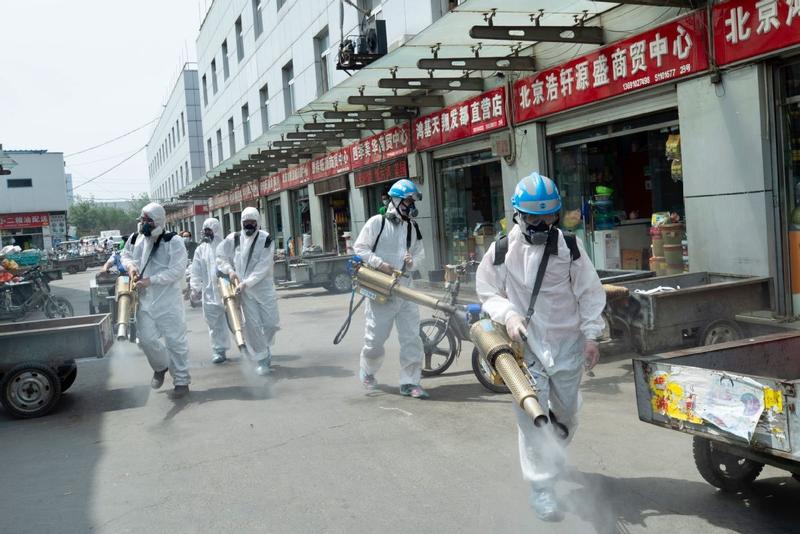 Workers disinfect the Yuegezhuang wholesale market in Beijing's Fengtai district on June 16, 2020. (ZOU HONG / CHINA DAILY)
Workers disinfect the Yuegezhuang wholesale market in Beijing's Fengtai district on June 16, 2020. (ZOU HONG / CHINA DAILY)
Beijing raised its public health emergency response from the third to the second level due to the new cluster of local COVID-19 infections and the number of confirmed cases in the city exceeding 100 over the past five days, a senior official announced on Tuesday.
Chen Bei, deputy secretary-general of the Beijing municipal government, said at a news conference that people should not leave Beijing unless their trip is essential.
All the new cases are related to the Xinfadi wholesale market in Fengtai district. The cluster of infections is believed to be associated with human-to-human transmission and contaminated objects, Chen Bei, deputy secretary-general of the Beijing municipal government, said
All the new cases are related to the Xinfadi wholesale market in Fengtai district. The cluster of infections is believed to be associated with human-to-human transmission and contaminated objects, Chen said.
Shi Guoqing, deputy director of the emergency center of the Chinese Center for Disease Control and Prevention, said the novel coronavirus was found on salmon cutting boards at the Xinfadi market in Fengtai, and it was not discovered before the salmon entered the market.
ALSO READ: Beijing steps up virus control as 27 new cases reported
Beijing's education authority announced on Tuesday night that all students in primary, junior high and senior high schools should stop on-campus classes starting on Wednesday and college students should stop returning to campus.
The city's authorities announced several measures under the second level of the public health emergency response.
Residents of Beijing's medium and high-risk areas, as well as those related to the Xinfadi market, should not leave Beijing. Other residents should not leave the city if the trip is not necessary.
Those who have to leave the city should first have negative nucleic acid test results no older than seven days.
All exhibitions, sports events and shows will be stopped and tourist services to other provinces and overseas are suspended.
Beijing reported 27 new COVID-19 patients on Monday, bringing the total of confirmed cases to 106 since the first new local case was reported on Thursday, after 57 successive days without new cases in the city.
"Beijing is facing a very serious epidemic situation," Xu Hejian, a spokesman for the municipal government, said at a news conference on COVID-19 on Tuesday.
Shandong, Zhejiang, Sichuan, Liaoning, Heilongjiang and Fujian provinces and Shanghai have introduced a range of quarantine measures for travelers from Beijing.
On Monday night, the Beijing municipal government asked several departments to jointly disinfect all farm produce markets and restaurants that have resumed service.
By 6 am on Tuesday, Beijing had disinfected 276 farm produce markets and closed 11 markets, according to Chen Yankai, deputy director of the municipal market supervision bureau.
READ MORE: Beijing swift to curb new COVID cases
Residential communities have restarted strict measures such as temperature-taking before entering.
The city government will roll out sweeping nucleic acid tests for residents living near a produce market in Xicheng district, after a market employee was confirmed to be infected with COVID-19 on Sunday.
Michael Ryan, executive director of the World Health Organization Health Emergencies Program, said on Monday at a news conference in Geneva that the WHO is working "very closely with authorities in China to understand what exactly the risks are here and will issue any guidance internationally accordingly".
Xinhua contributed to this story.


